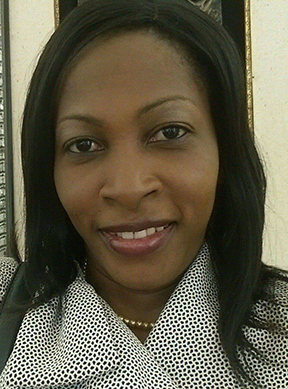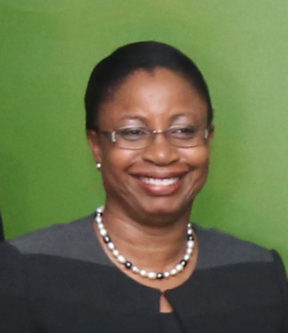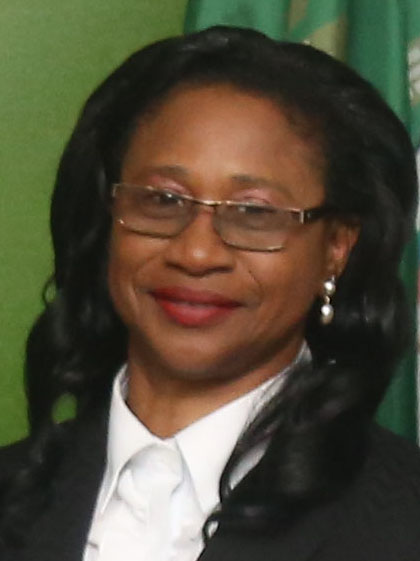The judiciary yesterday morning launched a two-day training exercise aimed at enhancing its capabilities in the adjudication of sexual offence cases and interaction with vulnerable persons in such matters.
Spearheaded by acting Chancellor Yonette Cummings-Edwards, the seminar, the first of its kind since the establishment of the court last November, is being facilitated by Trinidadian Clinical Psychologist, Dr. Diane Douglas and her associate, Natalie O’ Brady.
Boasting of Guyana’s establishment of the region’s first-ever Sexual Offences Court, the Chancellor underscored the need for training in psychological skills as a means of better assisting the judiciary in its interaction with vulnerable persons.

Because of the specialist nature of the court, which is dedicated exclusively to trying sexual offence cases, Justice Cummings-Edwards said it is important to enhance the efficiency of prosecuting such matters, while adequately responding to the needs of survivors.
She described the establishment of the court as an important milestone in the judiciary’s history, as it coincided with implementation of the model guidelines for sexual offences.
Recognising that testifying can be a traumatic experience for many, especially in sexual assault matters, the judge said in this regard, victim services for witnesses will help in reducing secondary victimisation and trauma.
She noted that such services are provided in large measure by the Ministry of Social Protection and Non-Governmental Organisations.
Apart from the needs of survivors, the Chancellor went on to note that the provision of psychological skills training is also important for trainers, support personnel, judges and magistrates alike, who all need support in coping with secondary trauma or post-traumatic stress.
These, she said, are all “occupational hazards,” which will also be addressed; while adding that the 2010 Sexual Offences Act recognises such needs and thus provides for such training. She describes the legislation as “comprehensive, interactive and forward thinking.”
Citing the judiciary’s partnership with UNICEF, the Chancellor expressed gratitude for its involvement with the training program, as it had been in the establishment of not only the Sexual Offences Court, but the Family Court as well.
‘Very worrying number’

For his part, UNICEF’s deputy country representative Paolo Marchi said it is pleased to provide to the judiciary whatever support it can, assuring that its involvement is not a “one-time, one-off investment.”
He said that UNICEF is committed to ensuring that every citizen, especially women and children have access to justice, noting its commitment to providing continued support.
He said that “the frequency and dreadful levels of violence demands action by all,” while noting that the establishment of the specialist Sexual Offences Court represents the country’s positive step towards responding to violence—in particular sexual violence.
Referencing what he said were records for the past three years, Marchi said there had been over 1,000 reported cases of violence and abuse, which he described as being “a very worrying number in a country like Guyana.”
It is against this backdrop that he said the Court is important, as through its specialised services, will also contribute to sending a message of speaking up against violence of all persons.
Speaking on UNICEF’s additional support to the judiciary, Marchi said that this year it is partnering with the Ministry of Social Protection in supporting the drafting and finalisation of the national plan of action for the implementation of the Sexual Offence Court.
He said there is need to partner with all stakeholders to raise awareness in preventing and responding to violence against all, while adding, “Only together we can make a difference.”
The country representative said that investments efforts are also being marked at the University of Guyana with its development of a full curriculum in psychology, geared towards the provision of competent psychologists to provide support which the court would need.
Acting Chief Justice, Roxane George, who chaired the proceedings, said she was particularly happy with the University’s partnership as there is need for more psychologists.
In so doing, she said, it is hoped that greater interest will be generated, especially among young people who pursue such an important profession.
Providing a statistical overview of the work of the Court for the past five months since its establishment, Justice Simone Morris-Ramlall, the first judge to preside in the court, said she has heard a total of 14 matters.
Of those cases, she said that seven were for sexual activity with a child/family member; which represents 50% and four she said, were for rape of a child under 16 years of age.
The judge said that all of the virtual complainants were females, with the exception of one person; and their ages at the time of commission of the assault ranged between 3 and 28.
Ten of the survivors she said, were 10 years or younger at the time of commission.
Meanwhile, the accused were above 30 years of age, and quite a few were over 40.
She said there were nine convictions, four acquittals and one hung jury.
Sentences imposed ranged from nine years, to life imprisonment. In the case of the nine-year sentence, the judge explained the offence was sexual activity with a child. She said that there was no penetration and there was no family relation between the survivor and convict.
The shortest trial she said ran for two days and the longest for eight.
Justice Jo-Ann Barlow, who is now presiding in the court in the current criminal session, has completed one trial for which sentence will be passed in another two weeks, after the presentation of a probation report.
Since the establishment of the Court, Justice Morris-Ramlall expressed the view that it has been fulfilling its expectations as a specialist court, while adding that it affords survivors the opportunity of testifying in a comfortable environment with facilities “which encourage them to give the very best of evidence.”
She said that all the complainants utilised audio-visual link, except for two who were adults. One of the complainants she said, testified via Skype from overseas.
Speaking of the technological features with which the Court is outfitted, the Chief Justice has described it as “state of the art, by Guyana’s standards,” which she said makes it more user-friendly, especially for survivors.
Of the 14 complainants, Justice Morris-Ramlall said that 12 of them had their support persons present who were from Blossom Inc, ChildLink, the Childcare and Protection Agency and relatives.
The judge said she has attempted to ensure the implementation of the sexual offences guideline which supports the timely resolution of matters.
The training session, which concludes today at the Georgetown Club, caters for judges, magistrates and other stakeholders.
Justice George said the judiciary is confident of the Court’s growth while assuring that although the specialised Court is only in Georgetown, the rules, principles and guidelines are being implemented in the High Courts in Berbice and Essequibo, by the judges who sit in those jurisdictions.
With time, she said, those locations too, will also have the specialised facilities in their courts.
The Sexual Offences Court was launched on November 13th last year, at the Georgetown High Court. Moments after, the Model Guidelines for Sexual Offence Cases, which are now being implemented in the Caribbean region, were also launched.
Speaking at that launch, judge of the Caribbean Court of Justice Maureen Rajnauth-Lee, had noted that the guidelines form part of a comprehensive approach towards improving the management of sexual offence cases and the treatment of witnesses and survivors of sexual offences.
She said that they are aimed at providing guidance to justice sector stakeholders, including judicial officers, attorneys, prosecutors, police and health and social care providers during the lifecycle of a case.
The guidelines are an initiative of the Judicial Reform and Institutional Strengthening (JURIST) Project, funded by the Government of Canada, and executed by the Caribbean Court of Justice.






